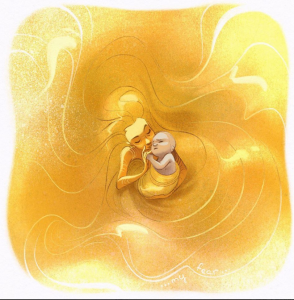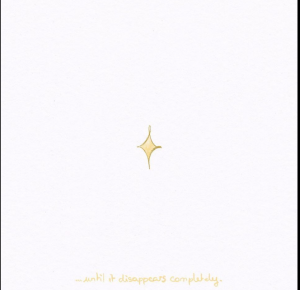




I could start the article by suggesting that the corona virus was developed and spread by the toilet paper industry, but that would be a lame joke. In fact, I don’t want to talk about COVID-19 at all. I want to talk about fears. Specifically, how to befriend your fears.
Let me clarify. I say fears. Not The Fear. The Fear is something else.
The Fear
One day, when I lived in the Amazon rainforest, I was walking on the ground (our houses are on stilts, since it’s all wetland), looking for a piece of lumber to chase away some wild boar that kept rummaging too close to our house for my taste. As I bent down to pick up the lumber, I caught a glimpse of something bright orange in the corner of my eye. The açaí palm leaves, when they die, turn quite orange. My last thought was: this is not a leaf.
When I lifted my head, still bent at the waist, I found myself eye to eye with a jibóia – a massive snake of at least four meters – still coiled up, but with its head raised. Staring at me. That’s when my mind stopped.
My reptilian brain – happily recognizing its sister out there – jumped into action. I slowly moved backward a few steps, turned around and ran. With such lightness and speed that I never thought was possible, much less for a woman in her eights month of pregnancy. I jumped back onto our bridge and called my husband. Who eventually came and scolded me for not “staying with the snake” so that he could see where it ran to. Funny man.
This was one of the most amazing, beautiful moments in my life. At no point did I ever have a problem. I didn’t worry about losing my sandals, scratching my feet on the jungle ground, running fast enough, jumping high enough, whether my baby would suffer an adrenalin rush or if it would hurt to be eaten by a snake. There was never time for that. Instead, my body did what living bodies do: it activated the flight or fight response and – for the first time in my life – very successfully so. I felt incredibly empowered, capable and strong, and I love snakes even more than I did before.
That moment was defined by primordial fear. Stimulated by a real threat. In the present moment.
Fears
What I want to write about now, are the fears, the angst and anxiety that crush our quality of life, hold us prisoner and paralyze our powers. All those fearful thoughts that have no basis in the present moment, but keep looking at a gloomy, illusory future.
Unlike the primordial fear, which is seated deeply in our natural instincts, our fears are not imposed on us or overpowering us from the outside. Fears are learned behavior. And like any learned behavior, we have a choice to apply that behavior or find alternatives.
What if I lose my job? My my mother doesn’t like the present I bought her! Will my wife leave me? What if my child will fail in life (looking at your nine year old that — isn’t that just unbelievable? — has no interest in sitting still for hours on an uncomfortable chair listening to algebra)? Oh, but what if I can’t pay the bills next month? And what if corona comes to our town (first the Germans hoarded groceries and toilet paper, because the Russians could come, then the Chinese, then the Africans — now they’re all here and our stores have more food than ever before, so thank God for corona that allows us to hoard again)? What if I lose my mind?
If you are the proud owner of any of these or similar angsts, I invite you to do a little reflection here.
-
Own your fear
I’ve kept producing and raising 2-year-olds for the sheer pleasure of playing hide-and-seek and watching them turn their backs on me, close their eyes and think I can’t see them anymore. The funny thing is, as much as we adults feel high and mighty for knowing that this doesn’t work, we continue to play the game precisely the same way when it comes to our unwanted feelings and fears. Turn our backs, close our eyes and pretend they are gone. And then we feel the cold touch of their hands on our backs.
It won’t do you any good to deny your fears. For the simple reason that denying them will not make them go away. That’s not the point anyways. Unless you are entirely enlightened, fears are and will be part of your life. Courage is not the absence of fear, but the ability to accept them and move ahead. Courage means you face your fears, thank them and then take over the driver’s seat.
So, step one is to own your fears. Accept them. Thank them. They are part of you and they serve a purpose. More about their purpose in number 6. For the time being, just own them.
-
What do you gain from holding on to your fear?
Before you holler “what’s wrong with you? Nothing at all!”, take a deep breath and sit with the question for a few moments. Then another few. No matter how much you think you suffer from having your fears, there are benefits that make you hold on to them. Maybe it gives you a sense of belonging. All of a sudden and for the first you’re engaged in a conversation with your neighbor, while both of you are piling up toilet paper and disinfectant into your cart. You affirm each other and it feels good.
If you have created your identity around being the tragic beauty that always falls into the hands of the beast, you’ll be hesitant to give up your fear of the bad man and accept that you can be an assertive, powerful partner to an equally assertive, powerful other.
Is your fear part of an unspoken agreement between you and your partner that creates the basis of your relationship? Does withdrawing into your fear guarantee his attention and affection?
Do you hold on to your fear, because you believe that fearing for your child is what makes you a responsible, caring parent? Do you believe that fearing to lose someone is a sign of your love for them?
As long as your gain from holding on to the fear feels bigger than the pain, you have no incentive to let go. So, start looking at it and question it.
-
Who would you be without the fear?
What would you do, think, feel, say if you didn’t have that fear? How would you live your live, how would you relate to the people around you, how would you feel about yourself? Without your fears to impose on your children, how would you connect with them? How would you do your work if you had no fear of losing your job or being ‘found out as fake’? Imagine and incorporate the person you would be without the fear and notice any changes in your body.
-
Get knowledgeable
At the core of our fears most often is ignorance. Most of us fear the unknown. Well, let’s get to know the monster then, shall we? The three year old may wail she’s seen the monster already and it’s terrifying, but when you ask her all the details she’ll eventually find that the monster isn’t that scary after all. The same is true for us. If you want to get a grip on your fears, do the work. Ask yourself: what exactly do I fear? What is it about dogs, women, trains, Chinese men or lightning that scares me?
Learn everything there is to know about them. Not from Fox News or your chatty neighbor. Learn from serious sources that have direct access and inside knowledge about the object of your fear. Scientific articles, dog trainers or Chinese women. Use your critical thinking.
What are the signs that make you think that you may lose your job? Did your boss tell you that? Has the company let go of a lot of people recently?
What exactly scares you about women? What do they do or say that you fear? Do they all do that? All the time? Have you ever met a woman who didn’t do or say what you fear?
Read about snakes. Where they are, how they live, what their primary prey is and how they’re usually happiest when they’re far away from people.
Read about corona virus and find out that we probably all had one at some point, because corona describes a whole family of viruses. Learn that 80% of people infected with COVID-19 feel what we all feel when we have the flu and then get on with life. That the other 20% that get more seriously ill are mostly older people with pre-existing diseases. Learn that while the world is upside down about this virus, every single day between 4,000 and 5,000 people die in car accidents. Get the bigger picture.
-
Answer your own question
It’s interesting how many people run around with a thought that starts with “What if….”, but actually never think beyond it. So, what if you DO lose your job? What if you do get sick, have no money, get divorced, make a fool out of yourself in public, have a macaroni hanging on your cheek? Spell it out in all the details, write it down. What is the worst that can happen? Then think about what you would do in such a case. Many times you’ll find that once you face the monster, it’s just another teddy bear that needs some washing.
-
Go to the roots
If you want to find out what is the fear behind your fear, go into the feeling. Whatever you fear is not the thing, person or disease, but how it makes you feel. Helpless. Exposed. Unloved. Abandoned. Go back to where you first had that feeling. Yes, that’s probably somewhere in your childhood. Now you are grown up. You have infinitely more resources and options now than you had when you were little. Look at that child with compassion. It’s still within you holding that fear to protect you from those feelings.
Except today you don’t need that protection any longer. Befriend your fears and you are powerful enough to deal with them. You can reach out to other people, you have more knowledge (even more once you’ve done your work in number 3), you have more choices. Thank you, fear, for wanting to protect me. I can move on without you now.
If you want me to support you in this, check out my special offer.


2 comments
This is a brilliant article Julia. I have always known that your articles would make interesting reading. Your experience is always good to learn from. I will never forget your Amazon and other stories. I sometimes actually use them in my speeches.
Thank you Andrew! I’ll make sure to keep them coming 🙂